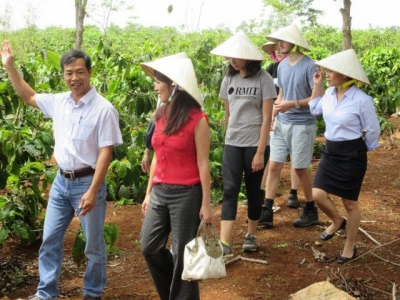Vietnamese gac fruit proving to have substantial health benefits

Dr. Tien Huynh from RMIT researching the exceptional health benefits of the native-Vietnamese fruit.
Dr Tien Huynh (L) - Photo: RMIT
Dr Tien Huynh, a Senior Lecturer at RMIT University in Melbourne, Australia, has travelled to many regions of Vietnam, Thailand and Sri Lanka to research the exceptional health benefits of the Vietnamese “gac” fruit and its ability to destroy cancer cells.
She is the only Vietnamese woman named by Science & Technology Australia as one of the 30 “Superstars of STEM”, selected from more than 300 applicants, in August 2017.
Gac fruit is well-known in Vietnam and often cooked with sticky rice to make “xoi gac”. In Sri Lanka it is used in curries and in Thailand it is made into ice cream. According to Dr Huynh’s studies, the natural compounds in gac have unique health benefits, particularly as a treatment against forms of cancer such as melanoma and breast cancer.
“The research findings show that gac contains up to 54 times more β-carotene than carrots and 200 times more lycopene than tomatoes,” she said. “It is made of substances that can kill 85 to 90 per cent of cancer cells, especially in skin and breast cancer.”
“I would like to promote the benefits of gac fruit, supported by science-based evidence, so that everyone can make it part of their daily diet, as it is native to Vietnam and is easily grown and readily accessible.”
Dr Huynh encourages people in Vietnam to use gac in everyday meals, for example with rice or consumed with coffee, in order to improve their health.
“I explored more than 18 provinces in Vietnam, four provinces in Thailand, and three provinces in Sri Lanka and found the fruit in Vietnam to be the best, with a high nutrition content, strong bioactivity against cancers, and the greatest diversity, especially in central and northern Vietnam, where some weigh over four kilograms,” she said.
The use of science and technology to confirm the health benefits of the fruit and improve the farming process will help protect the environment and improve incomes for Vietnamese farmers.
Mr. Nguyen Cong Kha, Director of the An Giang Biotechnology Center, which Dr Huynh visited recently to discuss future agricultural projects, believes the research is valuable.
In addition to her study of gac, Dr Huynh is also currently focusing her research on cancer, tissue repair, neuropharmacology, and drug discovery technologies.
While working on her unique projects, she also serves as a mentor for female Asian students and academics, inspiring them to reach for greatness and overcome challenges in their lives and careers. She also leads overseas work programs and transformative, sustainable projects.
During her recent trip to Vietnam, Dr Huynh, along with a group of Australian Environmental and Biotechnology Honours students, worked on research projects on the benefits of cocoa, coffee, and moringa in wound care treatment, brain health, and cancer.
Related news
 Vietnam shares experience on developing green agriculture at UN forum
Vietnam shares experience on developing green agriculture at UN forum Ambassador Dang Dinh Quy, head of Vietnam’s permanent mission to the United Nations (UN), presented the country’s policies and experience to promote green
 Local collective economy reaches good results
Local collective economy reaches good results Part 2: Upholding collective economy’s role in renewal period
 Bee raising under VietGAHP
Bee raising under VietGAHP The model of “Raising 180 swarms of domestic bee under Vietnamese Good Agricultural Husbandry Practices (VietGAHP)” at 9 households in the communes of Tam Tien